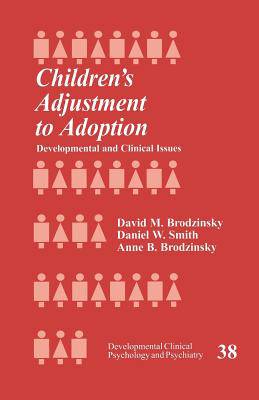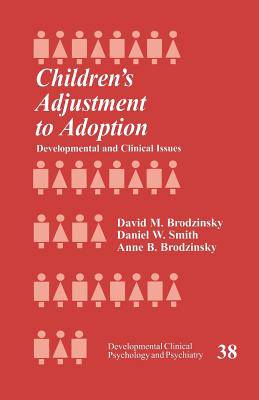
- Retrait gratuit dans votre magasin Club
- 7.000.000 titres dans notre catalogue
- Payer en toute sécurité
- Toujours un magasin près de chez vous
- Retrait gratuit dans votre magasin Club
- 7.000.0000 titres dans notre catalogue
- Payer en toute sécurité
- Toujours un magasin près de chez vous
Children's Adjustment to Adoption
Developmental and Clinical Issues
Anne B Brodzinsky, David M Brodzinsky, Daniel W Smith
216,95 €
+ 433 points
Description
This recent volume is an important resource for instructors, researchers, and clinicians interested in the development of children who have been adopted. Brodzinsky, Smith, and Brodzinsky offer an up-to-date and accessible review of the history of adoption, theoretical perspectives that are used to organize thinking about adoption, and research that has evaluated the adjustment of children who have been adopted. --Journal of Marriage and the Family "The style is confident and authoritative . . . . this is a useful digest which, . . . . provides academics and practitioners with a neat, solid guide to key research in the field." --David Howe, in Child and Family Social Work A significant contribution to understanding the effects of adoption, ChildrenÆs Adjustment to Adoption presents major issues that affect both the process and outcome of adoption for children and their parents. It begins with a historical and contemporary perspective on adoption and then focuses on the various theories that have addressed the issue of psychological risk associated with adoption. Extensive coverage is provided on the adjustment of children and parents to adoption itself and on the psychological development including adjustment and maladjustment over the course of childhood and adolescence. Children whose adoptions emerge from such circumstances as child abuse, parental drug use, and parental HIV are closely examined as are adoptions across racial and cultural lines. This volume offers extensive coverage of theory and research on children and families and the contextual issues pertinent to the adoption process, with clinical vignettes punctuating key points. The authors close with a discussion of intervention and assessment issues that commonly arise when working with adoptees and their families. ChildrenÆs Adjustment to Adoption is a welcome addition to the current literature on the psychological issues associated with adoption. It will be valuable for professionals in the fields of clinical and counseling psychology, developmental psychology, nursing, social work, health services, and family studies.
Spécifications
Parties prenantes
- Auteur(s) :
- Editeur:
Contenu
- Nombre de pages :
- 152
- Langue:
- Anglais
- Collection :
- Tome:
- n° 38
Caractéristiques
- EAN:
- 9780761905165
- Date de parution :
- 24-06-98
- Format:
- Livre broché
- Format numérique:
- Trade paperback (VS)
- Dimensions :
- 143 mm x 216 mm
- Poids :
- 204 g

Les avis
Nous publions uniquement les avis qui respectent les conditions requises. Consultez nos conditions pour les avis.






